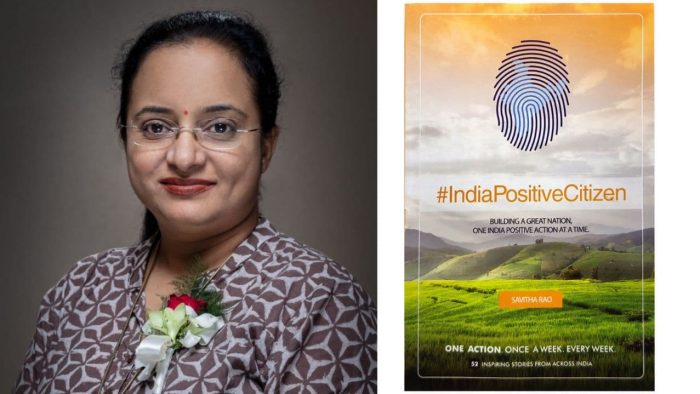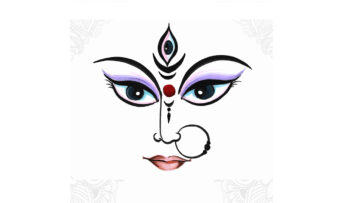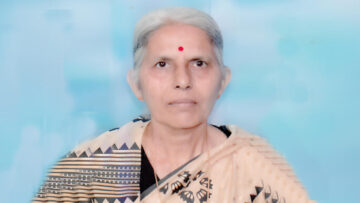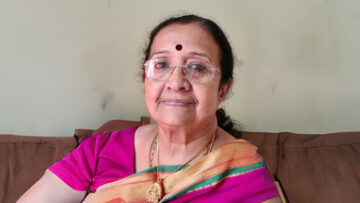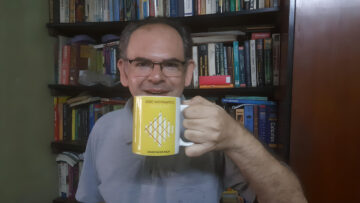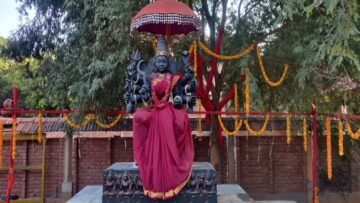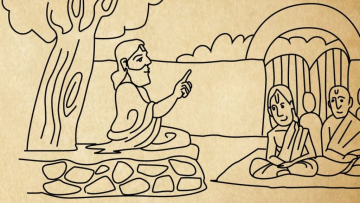Savitha ji, before we talk about your book, India Positive Citizen – One action. Once a week. Every week. Building a great Nation, one India Positive action at a time, and the wonderful reception it has received upon its recent publication, could you please tell us a bit about your background. This quote attributed to you, “If you want to inspire action, you have to lead by example”, sums up your life story, could you tell us a bit of your childhood, what is it that inspired you, who did you look up to, as your a role model, and who were your idols growing up?
I always loved reading. Books opened up new worlds. I loved school – I think more about my friends and the wonderful environment of the school. My role model was my father. He still is. He came from a modest background and created a business that brought well being to so many.
He is an incredibly generous person. My lessons in giving were from seeing him give with generosity and respect. He has positively transformed the lives of many people by being there for them.
I was inspired by Nelson Mandela and the way he triumphed over so many adversities and brought a divided nation together.
In one of your interviews, you mentioned that the deteriorating condition of the North Pole with its melting ice cap was the main reason which leads you to be an author. Could you please take us through that journey? Why do you think you were more affected by what was happening at the North Pole as compared to say something in Bengaluru, its lakes, and their worsening situation?
To this day I don’t quite know what about the North Pole moved me. But I am glad it did. At that point, I was all set to launch a range of men’s accessories – cufflinks, ties, etc. I had registered a brand name, designed the logo, created a collection of designs.
And then I read this article on the North Pole melting. I felt that when the planet was going to hell – creating a range of accessories would be akin to rearranging deck chairs on the Titanic.
I would, in my export work, persuade (sometimes insist ) clients to reduce plastic packaging, consolidate shipments. But I felt that was not enough. More needed to be done. So I decided to focus on sustainability.
Your training in International Marketing, as well as in being an Entrepreneur, along with your extensive international travel, did that have any direct influence on you in writing this book? Specifically your experiences in Japan, given how civic-minded and conscientious Japanese citizens are, did that have any bearing upon your decision to pen something to inspire Indians?
Japan had a strong influence on me. It is incredible how a densely populated Tokyo remains neat. It is because the citizens have a sense of responsibility and pride in their country. Every child is inculcated with it. After the second world war, Japan was in a state of shambles.
From that, they brought themselves to a point where the very word ‘Japan’ symbolizes quality. It did not happen with a few hundred or thousand Japanese. Everyone pitched in.
The inspiration for the book came from my work in the space of sustainability and then the meeting with Prime Minister Modi.
Your transition from working in high-end fashion creation, to a start-up on sustainable and eco-friendly products is fascinating. Was it the challenge of entrepreneurship, and also the fact that going green is fashionable in today’s age that leads you to this decision? Did you notice a lacuna that you could fill, given that there is a ready market for such green goods worldwide?
It was more a choice of the heart rather than seeing it as a business opportunity. In fact, sustainability was Greek to even educated people. To explain the need for it and to get them to buy products was quite a challenge. In the last few years, awareness has improved significantly. But we are nowhere near where it needs to be.
Could you walk us through your other various civil campaigns such as India Kuch Kar? Did your involvement in these grassroots campaigns expose you to the stories from the ground? Or did you collect material from your daily readings, from newspapers and social media reports? How did you conduct your research for the book?
India Kuch Kar was literally an outcome of my work in the sustainability space. It was immensely frustrating to see the apathy and powerlessness among people on the environment and civic issues.
We used graphics, satire in the campaign. It struck a chord with anyone who saw it. I have received pictures of the posters from Paranthe Wali Gali in Delhi to Baroda to Jaipur where the posters had been printed and put up by enthusiastic citizens. It was featured by some US-based social media pages where it elicited a great response.
In a way, the India Kuch Kar campaign laid the foundation for India Positive Citizen.
The book research was on specific topics. I wanted to cover as many aspects of life in India as well as include people from every region and age group of India. The youngest contributor to the book is 7.5 years and the oldest is 104 years.
In fact, while researching I got involved in some social work. I was looking to connect with someone who had done work in Kashmir. A friend connected me to Jai Kumar (he is featured in the story ‘Across States’ in the book). He helps schools in the remote regions of Kashmir.
I reached out to friends and we did crowdfunding to buy books, stationery, bags, etc for the children in Kashmir. The Exam Warriors book by PM Modi was part of the collection (it is a wonderful book that must be gifted to every child in India).
And also books from the Chinmaya Mission. So, even the writing of the book ended up with some creative India Positive actions involving many citizens in different locations.
In 2014 you ran the ‘India Vote Kar’ campaign – ‘Indian Idol, Big Boss ke liye vote Kiya? Ab India ke liye vote Karo’ (You’ve voted for Indian Idol and Big Boss? Now vote for India). Tell us more about your civic engagements, was it a natural progression from being ecologically responsible? Have you always been attracted to politics or was it something that happened as a result of your other achievements?
I was not aware of politics at all until 27 Oct 2013. My view was that all politicians were corrupt. In my work in international marketing, I had experienced firsthand the low image India had overseas. The poverty in the nation, the pathetic infrastructure, the corruption, the appalling handling of 26/11, the various bomb blasts across the nation, and the inaction left me very disappointed as a citizen. Until then I barely knew of Narendra Modi.
I had, of course, heard of him in the context of the 2002 riots. I remember seeing a large picture of Mr. Modi framed in a store in New Jersey in 2005. And I remember thinking this is quite unusual. My next memory of him was Sep 2013 when I saw the news on TV of him being declared PM candidate.
What I saw that day moved me. He stood calmly in the midst of a bomb threat. Had he panicked thousands of lives may have been put at risk due to the resultant stampede.
I watched how he handled the situation with courage. That is when I decided that this is a leader who should be supported. From not knowing anything about elections – we researched right from the basics on how to get a voter ID made (by informal research we found that a lot of the people we spoke with did not have a voter ID and were not clear on how and where to get it made) to inform people of the same.
The first phase of our campaign was to inspire people to get a voter id made and to inform them on how to get it done. The second phase was to motivate people to go out and vote. The poster you refer to was immensely popular.
A local theatre chain even put it up at the ticket booking windows for weeks. People put it in their residential and office buildings. Needless to say – I was very happy with the results of the 2014 Lok Sabha elections. And happy too about having contributed in my own way to it. As a nation, we chose wisely.
Your campaigns and creatives have always seen great success, whether it was recognition by the Fun Republic, or even by the Prime Minister, how do you manage to keep ideas fresh and imaginative? How does your team manage to connect to the masses and stay grounded? Do you follow any special regimen or policy that enables you all to keep your passion going? How do you keep up being a leader, with so many campaigns and so many projects at the same time? Has this multi-tasking helped in authoring your book?
As a person, I enjoy the diversity of multiple projects. Working on new ideas inspires me to do more and better. We had limited resources for the campaigns so we were forced to come up with creative ways to spread the word.
In any case, the idea was to inspire and empower people to make a difference. So we created content that people could easily download and use wherever they are in India. We kept the design and the look clean. We used only 2 colors to make it printer-friendly.
The campaign found appreciation from Ladakh, Sikkim and so many other places from India. BPCL took large flex banners and placed them in their various locations across India.
In the writing of the book, I have found yoga and Meditation helped me a lot. Some of my best ideas came after meditating and doing Suryanamaskar.
You cite Anita Roddick’s Body Shop and her book Business as Unusual as a source of inspiration in another interview. As a businesswoman one can appreciate the influence Anita has had on a whole generation of female entrepreneurs, but what about her book itself, did her book and her story make you want to write too?
Actually, her book inspired me to be an entrepreneur. I wanted my work to have a do-good factor embedded in it. So I researched many options – medicinal plants, orchids, etc. Reading her book was very liberating. I realized one could be in any business – as long as it is not alcohol, tobacco, or ammunition – and do good.
I was a fan of Body Shop long before I knew who the founder was. When I traveled overseas I would buy Body Shop products. Given the frequency of my travel, I was never out of stock.
So, when a friend gifted me the book I was naturally delighted and dived in to read it. Even now I go back to it every once in a while. It is on my office shelf.
How long did it take to compile the 52 stories that comprise the content of your book, of people who have made a difference to our country. They range from seven years of age to a hundred and four! What was your criterion of selection? Was it the uniqueness of their journeys, or the impact of what they were doing? Did you crowdsource these stories, or are they from personal research?
The book took over a year to write. The writing wasn’t so much the challenge as was making the time to write. And then subsequently structuring it. There is no book I could look up to, as a reference. I was essentially in unchartered territory trying to make my way.
I feel blessed to have written the book. In the process of writing it, I interacted with so many wonderful people across India. Unsung heroes who have quietly contributed to the nation. The stories of each of them will move the reader deeply.
The book showcases the compounding effect of action done consistently.
One India Positive Citizen can do 52 India Positive actions in a year.
One billion Indians can potentially do 52 billion India Positive actions.
In addition to the stories, the book has action ideas for several demographics – students, entrepreneurs, senior citizens, homemakers. As also different aspects of living – celebration, environment, etc.
After reading the book no one can say ‘I don’t know how to make a difference’.
The book represents many firsts, the subject, the style of writing. It is the world’s first book that invites the reader to write their name on the book (like a pledge).
There are many sections in the book for readers to write their ideas. And later in the book for them to write their actions done.
India Positive Citizen represents a new model for the world. One where every citizen is invited to make a positive difference while showing them multiple ways in which to get started.
Did you look for many publishers or did you always want to self publish? What about the marketing of the book? Was it easy given that you have a ready-made clientele and are also active on Social Media? Please take us through the steps of publishing and marketing.
I did explore the traditional publishing sector. It looked like they have a high degree of editorial control starting from the title. One company I spoke with said ‘We have an editorial team who meets once a month. They will review the manuscript and advise’.
The whole process would take 9-12 months AFTER the manuscript was done. Further, India Positive Citizen book is not a stand-alone book. It is part of a wider initiative. It is a book from the heart. I decided then that traditional publishing was not feasible for this project.
This is an ambitious vision. Most people struggle with discipline on goals pertaining to their health. Here the goal is to invite and inspire people to do some action every week for the country.
What has been heartening is the response from readers. Every person who has read the book has been inspired into action and appreciated the book. I have received messages on social media requesting the book to be published in Hindi. Am working on that now.
PM Modi sent a wonderful letter of appreciation in about 2 weeks of receiving the book.
The Indian Army appreciated the book. And they have kindly sent a copy to each of the families of the Galwan Heroes. The brother of a martyr who received the book reached out recently. It was an emotional experience for him and me. Media reports them as statistics but each one is a brave soul who made the choice to serve the nation.
We know so much about reel heroes. And so little about our REAL heroes, our soldiers. Through the platform of the India Positive Citizen movement, I plan to ensure that we know more about our real heroes.
Did your involvement in sustainability lead you to send along with Neem seeds in an eco-friendly pouch when anyone buys your book? Could you walk us through that back story, please? Have you heard of Mata Amritanandamayi ji’s campaign to offer saplings to children to plan during Vishu? Have you considered the possibility of a larger outreach via teaming up with someone like Jaggi Vasudev Ji, or Sri Sri Ji closer home, all of whom are working towards a greener planet?
Yes, my work in the space of sustainability led me to gift seeds along with the book. Air Pollution is a global crisis. It is an issue that isn’t understood by most people. Trees are the best air purifiers.
We researched various tree species and ultimately narrowed the choices to Neem and Moringa for the holistic benefits they offer and the fact that they can thrive in most parts of India. In the book, I have shared about Cauvery Calling and the environment projects by Sri Sri.
I have shared information and links to invite readers to explore and support such projects. In fact in the book, I have urged readers to combine digital giving and the environment. And to make regular contributions to individuals/organizations working in a dedicated way towards tree plantation.
In one of the chapters, ‘Air’, in the book, I have invited readers to reflect on planning for the future. ‘Planning’ essentially means financial planning; fixed deposits, mutual fund investments, real estate. Why does planning for the future not include clean air, land, and water?
Recently I teamed up with a wealth planner who shares my concern for the environment. He is now reaching out to all his clients to urge them to include tree plantation as part of their investment portfolio. We have termed it as adding green wealth to your portfolio and the planet.
What is your writing style? Do you shut yourself off from all other work, dedicating yourself to writing only, or do you write in between various other activities? Do you type? Or is it all handwritten and transcribed later? Did you have to research a lot for this book? Did you have to cross-check the various stories you mention in the book before you made them public? If so, how was that done?
My way of writing is to focus on a topic, do research (if facts are to be collated), eliminate distractions, and then the ideas flow. Either pen and paper or a laptop. Both work well for me.
My forte is workable, non-linear solutions. Let me explain. When I bought an office I had no idea that the road in which it was situated had no street lights. All my visits pre and post-purchase were during day time.
When we finally moved and started working I realized that the road was pitch dark. It was unsafe even for men. I immediately took pictures and sent a letter to the Municipal Commissioner.
Three weeks later I received a reply saying that this is a private road so they can’t do anything on it. Clearly, this road had been dark for years. All the people who had offices there or worked there suffered this problem. It would get compounded in the monsoon.
A waterlogged road with no light. In my building I got road facing lights installed at the entry and exit gates. It illuminated that stretch. Then I wrote a letter to EVERY building on the road and requested them to do the same. All of them co-operated. Some did so literally in 24 hours. Today the road is safe for all because of the community solution to illumination.
My ideas, therefore, aren’t limited to the book. Many such ideas have experimented with, implemented.
As a successful writer, what are some of the writing tips that you would like to share with our readers? Something to help new writers to keep the faith and persist in their chosen field. Would you suggest reading a lot of books, or would you say keeping away from reading during the process of finishing one’s work is preferable?
The core essence of my book I wrote in a handmade paper notebook. And then later typed it on a computer. To anyone aspiring to write I would say that a notebook is an invaluable ally.
Thoughts/ideas are like birds that come and sit on a branch for a few moments and fly away at the slightest distraction. Writing them makes a world of difference.
Believe in yourself. Tune in to your inner guidance. Be open to ideas and inputs. But at the end of the day, you must write what moves your soul. The message that you want to share with the world.
I have always been an avid reader. I did not try to read anything for the purpose of writing my book. I could not. Because there was no book of this kind.
I would say read up on the broad topic one intends to write is good from the perspective of knowing what is already written. And to know what new insights one can bring to the subject.
Is there a sequel in the offing? Your book has a similar positive feel-good feeling as Manoshi Sinha ji’s Saffron Swords, both of you have brought out little known stories to the forefront, lives of people who have contributed so much to our nation and who need to be celebrated. While the heroes and heroines she mentions are long gone, your stories are all the more inspiring because the people you write about are all living amongst us. Given that your book enjoys near 100% positive reviews, do you plan to write a sequel to your book? If so, when may we expect it to be published?
Both books are of course totally different. Manoshi’s book delves into history. Mine is about the challenges we face as a nation and what each reader can do to make a difference.
Manoshi Sinha has made a wonderful contribution to India through her book. We need to know about the unsung heroes of India. Her book tells us the history we were never taught. My book is about the challenges we face as a nation and what each reader can do to make a difference.
A lot of readers have reached out suggesting/requesting for India Positive Citizen to be translated into Indian languages. So the language editions will be the first priority.
At some point, I will update the book with more interactive exercises and collaborations. An unusual sequel possibly a year from now.
Are there any other areas of interest that you would want to write about? An autobiography perhaps? Or something on Indian Textiles? Perhaps on Indian Indigenous Sustainable Traditions? Recently Sinu Joseph Ji published Rtu Vidya, on indigenous practices regarding menstrual hygiene among Indian women, so something on those lines? And that begs the question of why not market eco-sanitary pads via your start-up? Given that you market other eco-friendly products, why not washable sanitary pads too?
I agree that eco-friendly solutions for menstrual hygiene are important. It is heartening to see a growing number of entrepreneurs focus on it.
The issues that we need to address sustainably are many. I am focusing on reducing plastic waste. And now focusing on eco-friendly air wellness solutions.
My next book will be on Air Pollution. It is a global crisis. In an age of information, we are incredibly ignorant of the causes and the solutions. Unless change happens at the individual level we can’t expect change at a macro level whether region or country or the planetary level.
My aim will be to connect the dots with the big picture. It won’t be a technical book. It will be a book for citizens to understand outdoor and indoor air pollution.
And what they can and should do to make a difference for their own sake. I already have an outline for that book. When time permits will start working on it.
What are some of the books you recommend that you have read this year? Do you listen to audiobooks? Are you planning to make an audiobook out of India Positive Citizen? That might help the visually impaired to learn about the wonderful life positive stories that abound in our country. Publishing books on Audible is another option or even a story-telling video format. What are your thoughts on these?
I read ‘Atomic Habits’ by James Clear. Great book. Currently reading ‘The Obstacle Is The Way’ by Ryan Holiday.
I am looking forward to reading ‘God’s Own Kitchen’ by Rashmi Bansal. The book is about the Akshay Patra Foundation. I admire the work by Akshay Patra and have featured them in my book.
Yes, audiobooks are very much part of the plan. By December I plan to initiate it.
So far I have not heard any book. I enjoy reading it. Perhaps once I hear a book I might enjoy that format too.
Tell us one thing about the Prime Minister that we have not heard already, or something that you genuinely felt about him when you met him. Have you always written letters of suggestions to heads of state? Here is the letter that you wrote to the PM in 2017, did you expect a reply at that point? Did you anticipate the kind of response it would generate? Have things gotten easier for you after you met the Prime Minister businesswise? Do vendors or students or dignitaries treat you differently?
It was wonderful to meet PM Modi. What I noticed is that he respects each person he meets with the gift of his complete attention. That is a very rare trait.
At the event, he spoke on very diverse issues, from defense to agriculture to food to fashion and many more topics. In each, he outlined a creative insight.
And connected the dots of actions to a larger vision. He has raised the interest, awareness, and understanding of many issues of national importance in millions of Indians. It is no mean feat considering how large and diverse we are as a nation.
Mann Ki Baat is a brilliant idea. I appreciate how he has done it diligently every month ( except 2 months around the Lok Sabha elections in 2019 where he took a voluntary break to respect the election code of conduct).
PM Modi has inspired citizens to share ideas and participate in nation-building. Since 2014 I have written innumerable letters to various people.
Some have resulted in tangible outcomes – including policy changes. When GST was launched I had some specific suggestions which were actioned upon.
In mid-April 2020 I reached out to PMO, Commerce Ministry, and MSME Ministry with the idea of making Country of Origin mandatory for online listings. Delighted to share that the idea was appreciated and it is now a policy in India.
Avdesh Anand reviewing your book on Good Reads says “This is a life-changing book… I must say that. I read the book and I was literally stirred into doing something for the locality’s drainage problem and I am on it. ” it must be very satisfying that you could bring about such change in people, but did you get any kind of negative feedback at all, any critique, any suggestions for improvement? If so would you like to share them with us please?
A lot of readers have shared such feedback. On civic issues, it has inspired many to take action. For most citizens civic issues are daunting. The examples and ideas in the book have inspired people to approach it with confidence.
There is a section in my book on ideas to be India Positive during celebrations. A reader Madhu based in Lavasa embraced it wonderfully.
On her sister’s birthday she single-handedly made homemade treats for around 60 people in their community; security guards, gardeners, housekeeping staff, postmen. Everyone who received it appreciated the treats and the respect it represented.
Vaishali Salunkhe, a reader from Mumbai, shared that she now buys extra food when she goes shopping and gifts them to children in the area. Her young son accompanies her while shopping. So, he too is now involved and learning from watching her making a difference.
The kindle book has been purchased and read by Indians from 7 countries; India, USA, Germany, Canada, UK, UAE, Brazil. In fact, a reader from Brazil shared that he has become more environmentally conscious after reading the book.
No. There has been no negative feedback or critique received yet regarding the book!
My book is for every Indian on the planet. I want India Positive Citizen to be a way of life for every Indian.
Ravi Upadhyaya says this in Good Reads reviewing your book: “I will pay it back by letting at least 20 readers know about the ideas in the book..“, was this the kind of scaling up of generosity and nation-building you had in mind? Or was it something larger, bigger? Have you held any press conferences, any meet and greets, any book readings, which could help in reader-author interaction? Could you please tell us a bit more about them if you did?
This is the kind of impact I had hoped the book would have. I am grateful to every reader for their time and inspired action. Honestly, because of the pandemic, I haven’t done any press conferences or book readings.
I am very happy that every person who read the book has been inspired into action. I get messages from readers on social media to tell me how much they loved the ideas and what they are doing in their own lives inspired by the book. In fact, after the launch of the book, I got busy working on a mobile app for India Positive Citizen.
Your book is dedicated to the soldiers who died fighting for India at Galwan, was it because you happened to publish your book around that time, or is it because you have a special place for the defense forces, the fauj, in your heart?
The soldiers definitely have a special place in my heart. They are sections in the book dedicated to the soldiers.
A key theme in my book is that while the soldier stands at the border and guards the nation, we (the civilians) must be the soldiers within the borders who nurture the nation with mindful actions.
I was deeply moved by the courage of our soldiers at Galwan and decided to dedicate the book to them. In fact, the book sales will fund scholarships in the memory of the Heroes of Galwan.
Swami Dayananda Saraswati Ji of Arsha Vidya would say that the sign of maturity in a human being is when s/he transforms from being a Consumer to a Contributor. The Bhagavad Geeta also talks of the Pancha maha yajna that must be done on a daily basis to give back to not just the society and the planet but also to our ancestors, rishis, and devatas. When and how do you think we lost this profound knowledge and practice and became a self-centered society? How would you suggest the youth be involved in the change? Could you also speak of any particular spiritual influences in your life?
We have a wealth of wisdom in our culture, one that we have moved away from. And have resorted to aping the West, turning into a consumerist society that a lot of nations have also become. When in fact India can be a beacon to the world.
We are the cradle of yoga and meditation. Yet it is not part of our education in schools or colleges. It is like having superpowers but using a wooden stick to deal with life’s challenges!
Ramayana has been a source of inspiration for me. My mother is very spiritual. I am blessed to have her influence in my life. Sadhguru and BK Shivani have been a positive influence on me.
In this context, I appreciate Mr. Modi. Look at the challenges life has thrown at him. Most people would crumble under the weight of such a burden. He has not just handled them but has also risen above them to lead and transform the nation. That kind of equilibrium and focus on progress comes from an inner space of spirituality.
How has been the response to your book? About the various messages in the book? Also was it a conscious choice to limit the book to 200 pages?
The book is meant for a very broad reader base. And it is meant to be read completely. Given those criteria, it had to be kept concise so that non-readers also find it easy to read.
The book connects at different levels. I know some readers who have read it so intensely that their recollection of it is sometimes more than mine.
The book is structured in a way that one can read it in segments. And any part you read will leave you inspired to be an India Positive Citizen.
Savitha Ji, we are very grateful for your interview, our readers and writers will definitely benefit from this interaction. Thank you so much for your time, we at Indic Today would like to congratulate you on your book and its success once again, and we look forward to reading more from you in the future.
INDIA POSITIVE CITIZEN: Building a great Nation, one India Positive action at a time is available for purchase from Amazon, Indiapositivecitizen.
Disclaimer: The opinions expressed in this article belong to the author. Indic Today is neither responsible nor liable for the accuracy, completeness, suitability, or validity of any information in the article.

